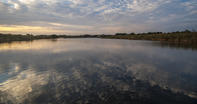Unpredictable Weather
Many moons ago, a young transport rider – who had been drawn to the flourishing businesses that grew up around the Kimberley diamond mines – decided to outspan his ox wagons and try his hand at something else. So he bought a small pont which crisscrossed the Vaal, carrying people, cargo and livestock across the river.

Much better business sense, he thought. And indeed it was, for a time. But then Alfred Whitfield and his business partner were forced by the landowner, on whose property the pont was stationed, to sell up and move on. The Whitfield history, meticulously recorded in a ring-bound file in the family homestead, remembers this as a remarkably good turn of events because fate was about to pull the rug out from under the pont business.
A highly virulent cattle disease swept down from North Africa, traversing the full length of the continent by 1892. Cattle dropped like flies, either to the Rinderpest virus or at the hand of cattle owners who killed their stock in an effort to curb the spread of the disease. Either way, the mass cattle deaths caused the transport industry to collapse – but it also brought in quarantine measures which banned the movement of cattle across the Vaal.
Engineers were also about to sling a bridge across the Vaal. Then the Vaal came down in spectacular flood and washed away the flat-bottomed ferry. Fortunately, by then the young Alfred Whitfield had taken the £3 000 in gold he made from the sale of the pont, and had bought himself a 4 000 morgen farm. That’s the thing with weather, you just never know.
By Leonie Joubert